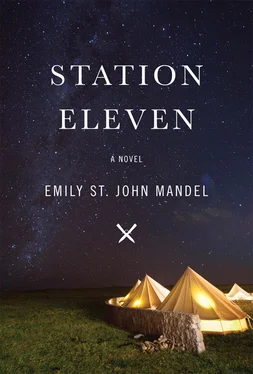“Thank you,” Arthur said.
ARTHUR THANKED HIM,and then what? On his brother’s sofa in a tower on the south edge of Toronto, eight days after Arthur’s death, Jeevan stared at the ceiling and tried to remember how it had played out. Had the publicist offered him a cappuccino? No, she had not, although that would’ve been nice. (Jeevan had been thinking of cappuccinos a great deal, because cappuccinos were among his favorite things and it had occurred to him that if everything was as bad as the television news suggested, he might never drink another. The things we fixate on, he thought.) Anyway, the publicist: she’d escorted him out without looking at him and closed the door in his face, and somehow this was already seven years ago.
Jeevan lay on the sofa, entertaining flashes of random memory and thinking of things like cappuccinos and beer while Frank worked on his latest ghostwriting project, a memoir of a philanthropist whose name he was contractually forbidden from mentioning. Jeevan kept thinking of his girlfriend, his house in Cabbagetown, wondering if he was going to see either of them again. Cell phones had stopped working by then. His brother had no landline. Outside the world was ending and snow continued to fall.
HE’D KEPT HIS WORD, THOUGH.This was one of the very few moments Jeevan was proud of in his professional life. He had told no one about Arthur and Elizabeth’s split, absolutely no one, for a full twenty-four hours after the interview.
“What are you smiling about?” Frank asked.
“Arthur Leander.”
In a different lifetime Jeevan had stood outside Arthur’s house by the hour, smoking cigarettes and staring up at the windows, dazed with boredom. One night he’d tricked Arthur’s first wife into an unflattering photograph, and he’d made good money on the shot but he still felt bad about it. The way she’d looked at him, stunned and sad with the cigarette in her hand, hair sticking up in all directions, the strap of her dress falling off her shoulder. Strange to think of it now in this winter city.
“YOU’VE GOT TO STOPsinging that song,” Frank said.
“Sorry, but it’s the perfect song.”
“I don’t disagree, but you’ve got a terrible singing voice.”
It was the end of the world as they knew it! Jeevan had had that song stuck in his head for several days now, ever since he’d appeared on his brother’s doorstep with the shopping carts. For a while they’d lived in front of the television news, low volume, a murmured litany of nightmares that left them drained and reeling, drifting in and out of sleep. How could so many die so quickly? The numbers seemed impossible. Jeevan taped plastic over all of the air ducts in the apartment and wondered if this was enough, if the virus could still reach them either through or perhaps somehow around the edges of the tape. He rigged Frank’s bath towels over the windows to prevent stray light from escaping at night, and pushed Frank’s dresser in front of the door. People knocked sometimes, and when they did Jeevan and Frank fell silent. They were afraid of everyone who wasn’t them. Twice someone tried to break in, scratching around the lock with some metal tool while Frank and Jeevan waited in an agony of stillness, but the deadbolt held.
Days slipped past and the news went on and on until it began to seem abstract, a horror movie that wouldn’t end. The newscasters had a numb, flattened way of speaking. They sometimes wept.
Frank’s living room was on the corner of the building, with views of both the city and the lake. Jeevan preferred the view of the lake. If he turned Frank’s telescope toward the city he saw the expressway, which was upsetting. Traffic had inched along for the first two days, pulling trailers, plastic bins and suitcases strapped to roofs, but by the third morning the gridlock was absolute and people had started walking between the cars with their suitcases, their children and dogs.

By Day Five Frank was working on his ghostwriting project instead of watching the news, because he said the news was going to drive them both crazy, and by then most of the newscasters weren’t even newscasters, just people who worked for the network and were seemingly unused to being on the other side of the camera, cameramen and administrators speaking haltingly into the lens, and then countries began to go dark, city by city — no news out of Moscow, then no news out of Beijing, then Sydney, London, Paris, etc., social media bristling with hysterical rumors — and the local news became more and more local, stations dropping away one by one, until finally the last channel on air showed only a single shot in a newsroom, station employees taking turns standing before the camera and disseminating whatever information they had, and then one night Jeevan opened his eyes at two a.m. and the newsroom was empty. Everyone had left. He stared at the empty room on the screen for a long time.
The other channels were all static and test patterns by then, except for the ones that were repeating a government emergency broadcast over and over, useless advice about staying indoors and avoiding crowded places. A day later, someone finally switched off the camera on the empty newsroom, or the camera died on its own. The day after that, the Internet blinked out.
Toronto was falling silent. Every morning the quiet was deeper, the perpetual hum of the city fading away. Jeevan mentioned this to Frank, who said, “Everyone’s running out of gas.” The thing was, Jeevan realized, looking at the stopped cars on the highway, even the people who hadn’t run out of gas couldn’t go anywhere now. All the roads would be blocked by abandoned cars.
Frank never stopped working. The philanthropist’s memoir was almost complete.
“He’s probably dead,” Jeevan said.
“Probably,” Frank agreed.
“Why are you still writing about him?”
“I signed a contract.”
“But everyone else who signed the contract …”
“I know,” Frank said.
Jeevan was holding his useless cell phone up to the window. A NO SERVICE AVAILABLE message flashed on the screen. He let the phone fall to the sofa and stared out at the lake. Maybe a boat would come, and …
On silent afternoons in his brother’s apartment, Jeevan found himself thinking about how human the city is, how human everything is. We bemoaned the impersonality of the modern world, but that was a lie, it seemed to him; it had never been impersonal at all. There had always been a massive delicate infrastructure of people, all of them working unnoticed around us, and when people stop going to work, the entire operation grinds to a halt. No one delivers fuel to the gas stations or the airports. Cars are stranded. Airplanes cannot fly. Trucks remain at their points of origin. Food never reaches the cities; grocery stores close. Businesses are locked and then looted. No one comes to work at the power plants or the substations, no one removes fallen trees from electrical lines. Jeevan was standing by the window when the lights went out.
There was a stupid moment or two when he stood near the front door, flipping the light switches. On/off, on/off.
“Stop it,” Frank said. He was taking notes in a margin of his manuscript in the gray light that seeped in through the blinds. “You’re driving me crazy.” Frank was hiding in his project, Jeevan had realized, but he couldn’t begrudge Frank the strategy. If Jeevan had had a project, he’d have hid in it too.
“It could just be us,” Jeevan said. “Maybe just a blown fuse in the basement?”
Читать дальше













